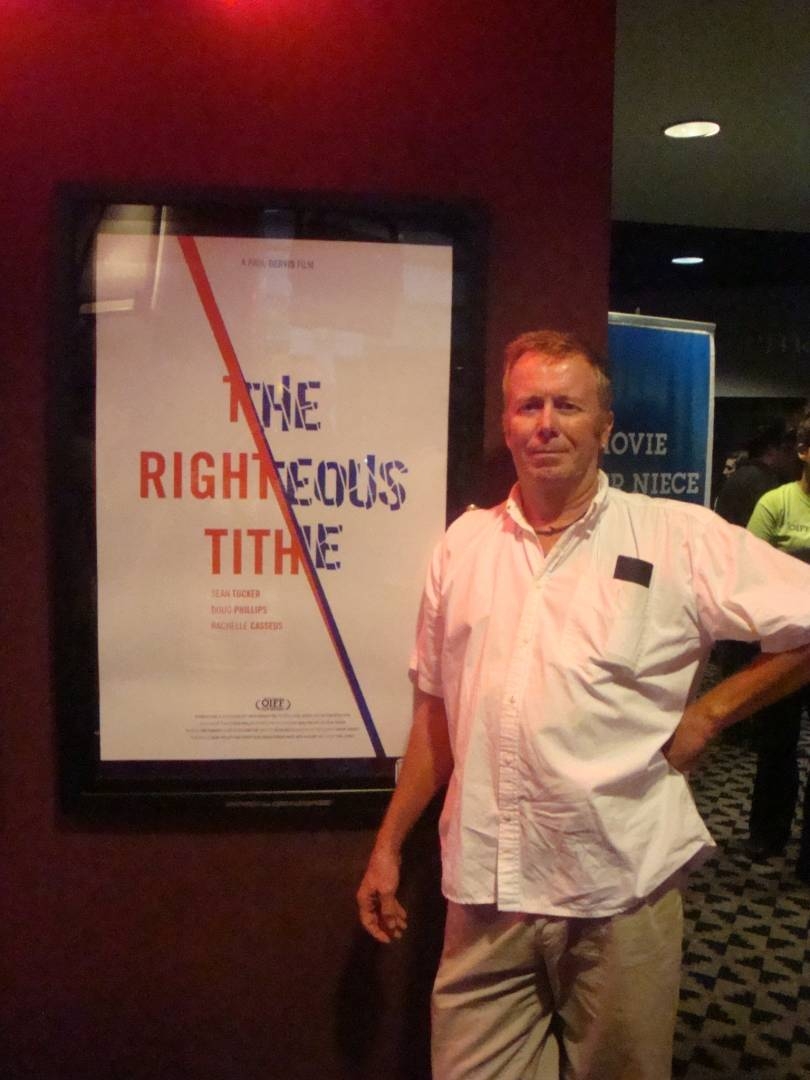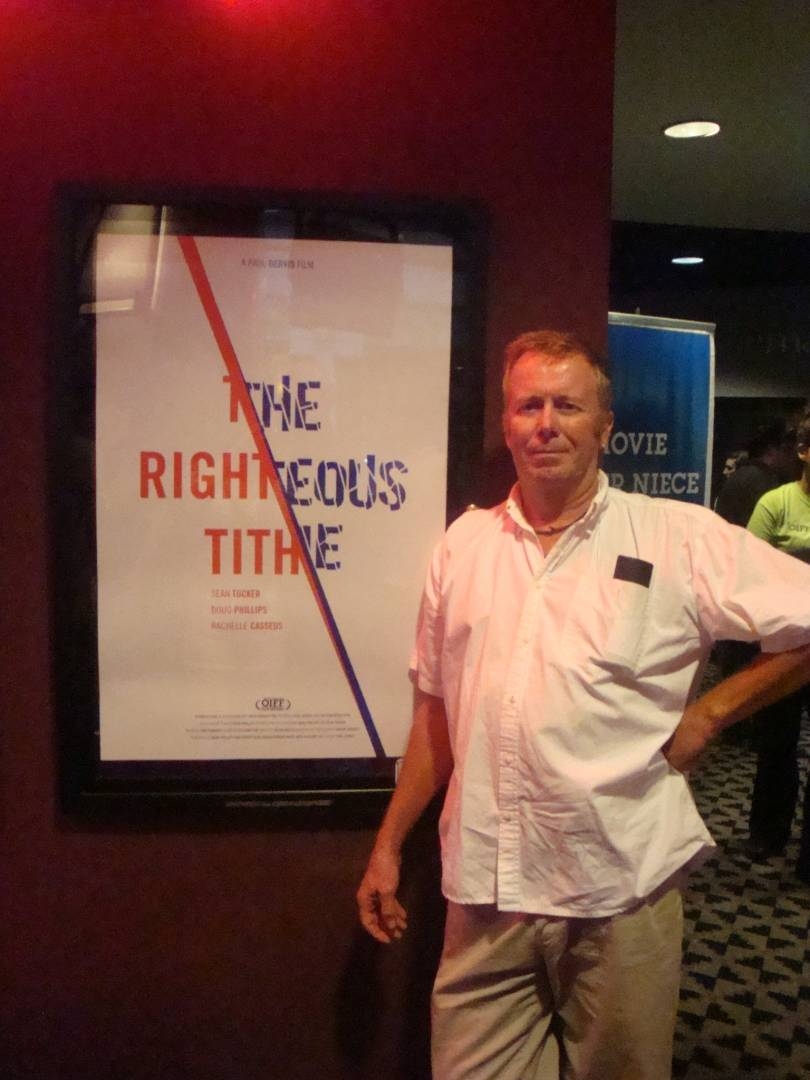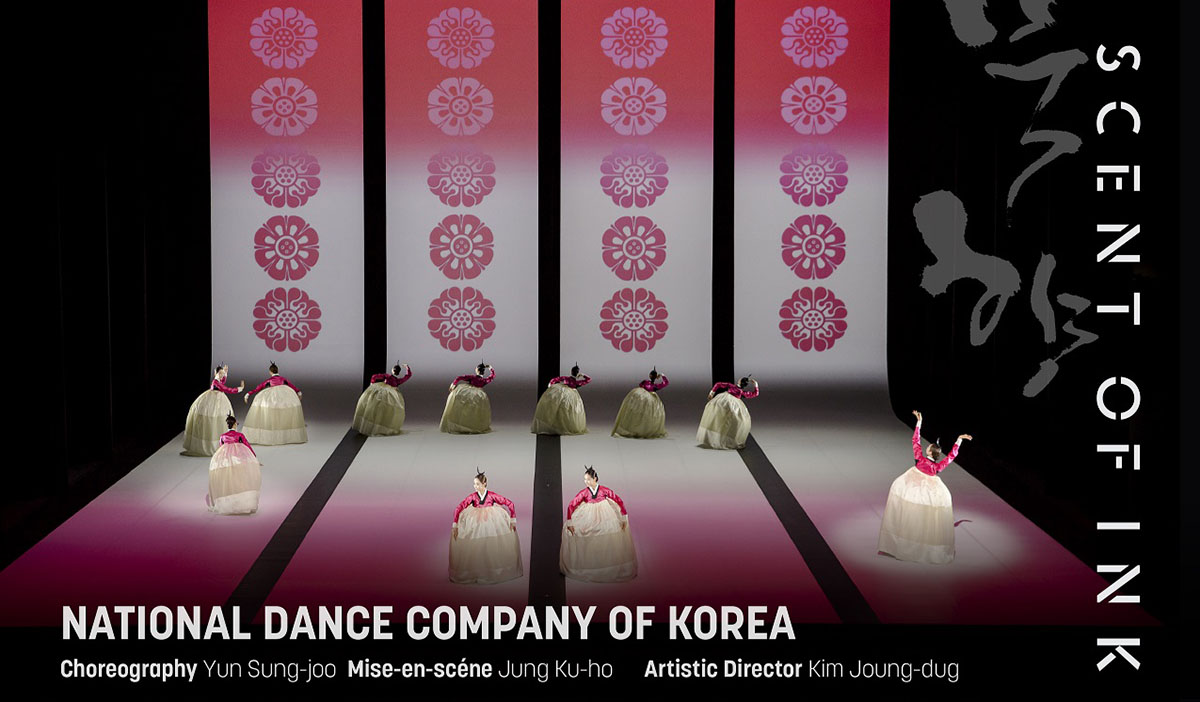
From Stage to Silver Screen Doug Phillips Finds Himself in The Righteous Tithe
It is Sunday afternoon, the ten year anniversary of 9/11. I walk into a coffee shop in Westborough, and see my interview subject waiting for me. I think about the state of affairs in the world, and recognize the 9/11 connection to the interview I am about to conduct. Doug Phillips is the mastermind behind The Righteous Tithe, a play-turned-film about the effects of that tragic day on policy and on people. On approach, I see he is reading David Mamet’s Theatre – a clue to the type of storytelling Phillips prefers. “I like Mamet’s book,” says Phillips, “because basically it’s an all out attack on the pretentiousness of theatre and how we’re supposed to think, and I’ve never been in sync with that elitist type of thinking.” Phillips is a realist, and his post 9/11 tale is as real as it gets.
The Righteous Tithe was a play staged in 2009 at The New Ottawa Repertory Theatre and a 2011 film, which had its first screening at this year’s Ottawa International Film Festival (OIFF). It is about a married couple that attempts to cross the border into the United States for a vacation. The man, originally from Britain, has not obtained his Canadian citizenship, which becomes an issue of immigration at the U.S. border – or so they are led to believe. It is a post 9/11 world, and the Patriot Act is fully in effect. The inspiration comes from a mixture of a 60 Minutes episode, Phillips’ own experiences, and his friends’ experiences with border control. “I find realism is much more interesting. Real life is much more interesting than fiction,” he says. The story unfolds as a harsh critique of the American security system. It comes from a mind rife with political astuteness, but low on professional theatre and film experience.
“I didn’t go to theatre school,” explains Phillips. “I didn’t even finish high school. I never wrote a play til’ five years ago. I never even saw a play until six years ago.” In fact, transitioning into a livelihood of writing and acting from one of chimney sweeping and brick lying is entirely incidental. Phillips grew up in parts of London where the idea of being a professional in theatre would get him laughed-at. “It’s not something I ever dreamt of doing,” he says. It began six years ago, when Phillips’ daughter asked him to find a father-daughter activity, and audition for A Christmas Carol production in Theatre Night in Merickville. They got their respective parts, and the rest is history. Well, not quite.
Phillips did not exactly start from scratch. His affinity for prose began long before. He has won regional awards for his short stories. Once he started writing plays, he found the community responded. His first play, Nann Bread – in which he also starred – won an Ottawa Little Theatre award. The Righteous Tithe was also a nominee for best professional production in the 2010 Capital Critics Circle awards, losing out to the NAC. Meanwhile, the closest Phillips ever came to the film world is by being a self-professed film nut. Out of this comes a stage-to-screen crossover, one that Ottawa’s arts community can be proud of.
“A good play doesn’t guarantee a good film,” recognizes Phillips. Films that come from acclaimed stage productions have several things to prove. Can a good play successfully transfer into an equally-good film? Can the actors transfer their winning stage roles into winning screen roles, while holding on to the essence of what made the characters so appealing theatrically? These are just some of the concerns Phillips had to face.
He takes his cues from the right place, in play-turned-film predecessor Proof, the 2005 film gave Gwyneth Paltrow one of her most acclaimed roles to date. “If you want to be a playwright, watch Proof, even as a film.” While not a British-play-turned-Hollywood-film with internationally-renowned starts, The Righteous Tithe has just as much to prove. Much like Proof, the strength of Tithe is in the writing. Set almost exclusively in a small interrogation room, the dialogue and characters carry both productions. The audience experiences extreme fear and anxiety, and it is all encapsulated in one tiny interrogation room.
However, there is an essential difference to the two storylines. There is a distinct message in both, which is that American security measures after 9/11 are overly harsh and encourage discrimination. What is added in the film is the entire storyline of the immigration officer having a personal tragedy around the events of 9/11. It produces a humanizing effect, where the audience is given reason to empathize with the antagonist’s misguided actions. Phillips says that the play was “much more critical of large government corruption, and the Patriot Act in particular, without having to justify itself.” He later adds: “I never thought I’d thank […] George Bush for anything, but this play is it.”

The transition to film could have been too much to bear for film amateur Phillips, had it not been for the lush Ottawa talent surrounding him. Most of the wisdom comes from Ottawa actor Sean Tucker, explains Phillips. Tucker, who plays the threatening FBI immigration officer in both play and film, largely does film now. One of his notable roles is in George Clooney’s Confessions of a Dangerous Mind. He made an exception in this case because he loved the script, “which I was very complimented by,” says Phillips.
It seems that Tucker’s mind was never far from the film world though. At rehearsal one day, Tucker suggested turning Tithe into a film, after a joking request by Phillips to make him into a film star. While the play’s director, Paul Dirvis, was up for the task, the film guru that also joined the winning team was director of photography Andian Langley. Langley has been one of Ottawa’s busiest filmmakers of 2011, showing three other productions at OIFF, including the award-winning A Violent State.
Low on money and high on creativity, Ottawa had the goods in other ways as well. The setting is brilliantly designed. Here is a hint: next time you go into the Nepean Arts Centre, you might want to poke around and find the room in which they filmed the immigration office. Meanwhile, the claustrophobic interrogation room was set up at an old coffee roasting warehouse on Bank Street. It was also essential for Phillips that the film contain as many of the same actors as they had in the play, as they knew their roles intimately.
But how does a play get turned into a screenplay? The next step in the process was to sit down and decide which parts to keep, and which to cut. Phillips explained that this is essential, as “rewriting is the essence of playwrighting. When you write a play, be ready to change everything.” For one, all the required expositions in the play – the description of traveling in a car and other transition scenes – could now be shown in a camera sequences, sans dialogue. “One little scene has taken two sentences, or 25 words, out of your play,” Phillips explains.
Cast directing was also approached differently. “Film is a more subtle medium,” explains Phillips. He describes having the ability to mutter a sarcasm-drenched phrase under his breath in the film, which he had to clearly enunciate in the play. The final cuts were made in the post-production stages, where parts end up on the cutting room floor. Phillips reacts to this from a playwright’s perspective. “It’s very strange to watch the film and realize those lines are missing. Cause’ I miss them.”
But the extreme difference in making the two was money. “Making a film is a lot more expensive than making plays,” Phillips chuckled. The film was entirely funded out of their own pockets, for purposes of having creative autonomy on such a controversial topic. But the film does not suffer from lack of funding, as production quality far outweighs the size of its pocketbook.
Aside from his new life as playwright and film star, Phillips has taken on the role of teacher as well. He can be found teaching a class on playwrighting at the Ottawa School of Speech and Drama.













